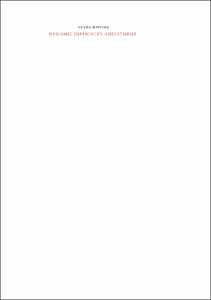Dynamic Difficulty Adjustment

Dynamic Difficulty Adjustment

| dc.contributor.advisor | Gärtner, Thomas | |
| dc.contributor.author | Missura, Olana | |
| dc.date.accessioned | 2020-04-21T09:46:04Z | |
| dc.date.available | 2020-04-21T09:46:04Z | |
| dc.date.issued | 30.10.2015 | |
| dc.identifier.uri | https://hdl.handle.net/20.500.11811/6543 | |
| dc.description.abstract | One of the challenges that a computer game developer faces when creating a new game is getting the difficulty right. Providing a game with an ability to automatically scale the difficulty depending on the current player would make the games more engaging over longer time. In this work we aim at a dynamic difficulty adjustment algorithm that can be used as a black box: universal, nonintrusive, and with guarantees on its performance. While there are a few commercial games that boast about having such a system, as well as a few published results on this topic, to the best of our knowledge none of them satisfy all three of these properties. On the way to our destination we first consider a game as an interaction between a player and her opponent. In this context, assuming their goals are mutually exclusive, difficulty adjustment consists of tuning the skill of the opponent to match the skill of the player. We propose a way to estimate the latter and adjust the former based on ranking the moves available to each player. Two sets of empirical experiments demonstrate the power, but also the limitations of this approach. Most importantly, the assumptions we make restrict the class of games it can be applied to. Looking for universality, we drop the constraints on the types of games we consider. We rely on the power of supervised learning and use the data collected from game testers to learn models of difficulty adjustment, as well as a mapping from game traces to models. Given a short game trace, the corresponding model tells the game what difficulty adjustment should be used. Using a self-developed game, we show that the predicted adjustments match players' preferences. The quality of the difficulty models depends on the quality of existing training data. The desire to dispense with the need for it leads us to the last approach. We propose a formalization of dynamic difficulty adjustment as a novel learning problem in the context of online learning and provide an algorithm to solve it, together with an upper bound on its performance. We show empirical results obtained in simulation and in two qualitatively different games with human participants. Due to its general nature, this algorithm can indeed be used as a black box for dynamic difficulty adjustment: It is applicable to any game with various difficulty states; it does not interfere with the player's experience; and it has a theoretical guarantee on how many mistakes it can possibly make. | en |
| dc.language.iso | eng | |
| dc.rights | In Copyright | |
| dc.rights.uri | http://rightsstatements.org/vocab/InC/1.0/ | |
| dc.subject.ddc | 004 Informatik | |
| dc.title | Dynamic Difficulty Adjustment | |
| dc.type | Dissertation oder Habilitation | |
| dc.publisher.name | Universitäts- und Landesbibliothek Bonn | |
| dc.publisher.location | Bonn | |
| dc.rights.accessRights | openAccess | |
| dc.identifier.urn | https://nbn-resolving.org/urn:nbn:de:hbz:5n-41443 | |
| ulbbn.pubtype | Erstveröffentlichung | |
| ulbbn.birthname | Trubina | |
| ulbbnediss.affiliation.name | Rheinische Friedrich-Wilhelms-Universität Bonn | |
| ulbbnediss.affiliation.location | Bonn | |
| ulbbnediss.thesis.level | Dissertation | |
| ulbbnediss.dissID | 4144 | |
| ulbbnediss.date.accepted | 02.10.2015 | |
| ulbbnediss.institute | Mathematisch-Naturwissenschaftliche Fakultät : Fachgruppe Informatik / Institut für Informatik | |
| ulbbnediss.fakultaet | Mathematisch-Naturwissenschaftliche Fakultät | |
| dc.contributor.coReferee | Wrobel, Stefan |
Files in this item
This item appears in the following Collection(s)
-
E-Dissertationen (4387)




